
So, I knew a guy once who did a series of podcasts about pop culture that wasn't as feminist as it pretended to be and followed that with a podcast about toxic masculinity in pop culture. Genre discussions with him were about as fun as they sound, so we eventually parted company. Lectures about the inherent misogyny of pop culture I liked such as slasher films or James Bond movies proved to be a bit of a chore, but had he sighted The Man with the Golden Gun as an example, I'd have struggled to defend it. The franchise probably has more objectionable moments sprinkled throughout its history, but this film feels so stuffed with sexism and an odd cruel streak, that I'm at a bit of a loss.
Of all the James Bond films I've covered, and we're in the home stretch now so that's quite a few, 1974's The Man with the Golden Gun might be the most frustrating. A pure misfire such as A View to a Kill, Die Another Day, or can be a slog, but their flaws are built in to their very marrow. They seem destined to fail, because their genetic code only exists to birth flawed cinematic offspring. The Man with the Golden Gun frustrates, on the other hand, because it has the elements necessary for a strong Bond outing but manages to bungle the execution at nearly every turn.
Following Lulu's endearingly swingin' 60s titular theme, we're given the narrative basics. Francisco Scaramanga aka The Man with the Golden Gun (Christopher Lee) has marked James Bond (Roger Moore, in his second outing) as his next target.
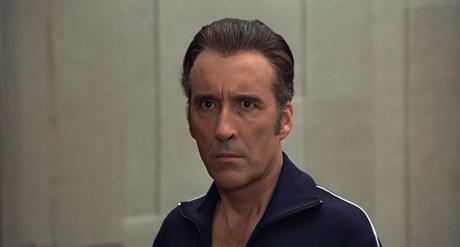
Bond has previously been given an assignment related a scientist named Gibson and his plan to use solar power to combat the energy crisis. (The 1973 energy crisis had shaken Britain and the country was still reeling from its impact by the film's release.)
With no idea who's hired the assassin to take Bond out, although M seems to have a hilariously lengthy list of "jealous husbands, outraged chefs, [and] humiliated tailors," who would want Bond dead, he's taken off the mission due to the potential target on his back.
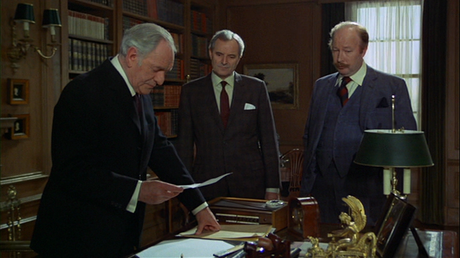
After all, no one knows what Scaramanga looks like, save for a superfluous nipple, so they're uncertain how to protect him, and they don't want Bond's death serving as an unnecessary distraction to a mission that could solve an energy crisis. With M's unofficial endorsement, Bond decides to pursue Scaramanga in the hopes of drawing him out of hiding and getting his mission back on track.
The film's setup is promising. While it's not exactly a "Bond goes rogue" plot, it's "Bond takes an unofficial side mission," which has potential. When it turns out that Scaramanga's ill-fated paramour, Andrea Anders (Maud Adams, the sole actress to play two different Bond girls), put the hit out on Bond in the hopes he would kill Scaramanga, finally freeing her from his clutches, the film seems even more rife with intrigue.
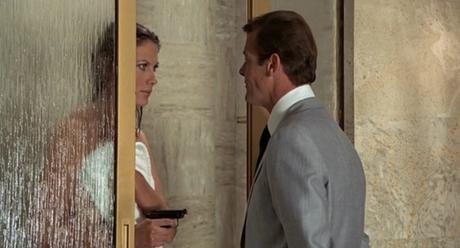
Unfortunately, by coincidence of all coincidences, Scaramanga has his own interest in Gibson and his solar energy research, turning him from an assassin for hire into just another megalomaniac with plans to use solar energy for destruction. This means what could have been a film with refreshingly low stakes and The Most Dangerous Game homages mutates into a standard "world in crisis" plot. It's not unexpected that the Bond franchise would boil down to the Solex Agitator MacGuffin, but introducing it at the expense of its more interesting setup is especially disheartening. The film zigs when it should zag, and that misstep derails it in a way from which it cannot recover.
When the film puts its focus on Lee's villainous portrayal, it clicks into place. His suave, icy portrayal of Scaramanga commands the film whenever he's onscreen. He exudes a magnetic sense of menace. When Moore and Lee have their fateful encounter at a Muay Thai match, it's one of the film's highlights, as is their dinner table conversation about what it means for each of them to take a life.
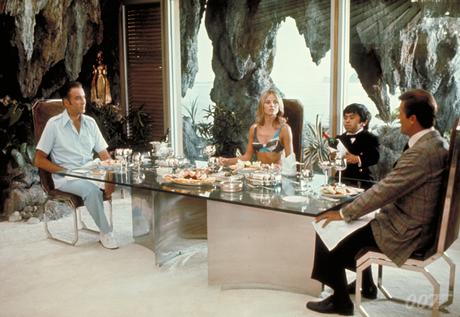
Whenever they're on screen together, the film has an electricity it never has otherwise. He emerges as Bond's dark half, which is initially intriguing but remains half-baked. I wish he had a film worthy of his talents, but Lee remains one of my favorite Bond villains. Any affection I have for The Man with the Golden Gun stems from his perfectly pitched, charismatic screen performance.
Alas, the rest of the film features an uncomfortable mixture of meanness and broad humor that never balances out. I know we're early in Moore's tenure here, and later films better adapt to his strengths, but this is the closest his Bond comes to being an irredeemable jerk. Whether it's twisting the arm of a woman he's interrogating, knocking a child out of his boat, or putting Nick Nack (Hervé Villechaize), Scaramanga's defeated henchman, into a wicker basket attached to his ship's mainmast, his portrayal of Bond feels nastier than it should and it rests uncomfortably against his cool, sophisticated demeanor.
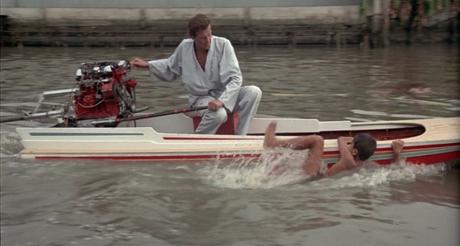
The best Moore films use his perpetually cool and urbane demeanor to give his Bond a gentle charm that distinguishes him from Connery's base appeal. The Man with the Golden Gun appears to attempt to shove his portrayal into the Connery mold and the disconnect between the two never resolves, and it's easy to sense Moore's discomfort with the character's awfulness.
The film's decision to reintroduce redneck sheriff JW Pepper (Clifton James), after he nearly derailed Live and Let Die, might be its most head-scratching choice. There's difficulty believing this inbred moron would have ever had interest in getting a passport, much less deciding to vacation in Thailand. He seems more the, "why should I leave the country when everything I could ever want to see it in the southeast region?" type. When he first appears, I audibly groaned in disgust. When he has the nerve to appear again, my jaw dropped in sheer horror at the misguided hubris required to assume audiences would welcome the character back.
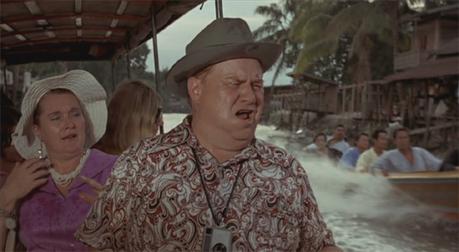
The film uses him as a way of lessening Bond's inherent cultural superiority by having poking fun at a character so unsubtly racist that he repeatedly refers to Thai citizens as "pointy heads" with all the volume his voice can muster, but no moment with his works. He's too broad to feel naturally placed. He's an irritating, noxious presence in Live and Let Die and he's just as repugnant a character here.
Then, we have Britt Ekland's Mary Goodnight, a stunningly pretty, bewilderingly dense MI6 agent, who attempts to assist Bond but tends to just make matters worse through sheer incompetence. While Ekland's pairing with Lee made me hope that Bond had happened to wander onto The Wicker Man 's Summerisle, that was not to be the case. Mary Goodnight might be the franchise's worst Bond girl. I'd like to criticize Bond for his constant belittling of her abilities, but she doesn't provide much evidence that she's undeserving of every scornful insult directed her way. While her bikini-clad frame likely contributed the sexual development of many teen boys and girls (I mean, if I had those abdominal muscles, I'd just walk around in that bikini all the time too), her acting ability is nonexistent.
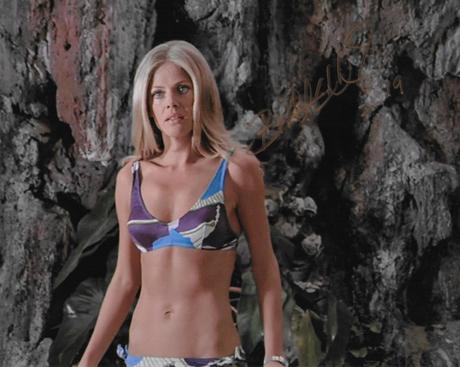
Director Guy Hamilton had three prior Bond films to his credits, including Goldfinger, which set the template from which nearly every James Bond installment would pull. The Man with the Golden Gun would be his final foray into the franchise, and it's not difficult to see why. Trading an exciting cat-and-mouse plotline for something more standard remains an uninspired choice. Any moment that works does so through Christopher Lee's sheer charismatic force, and the film is almost worth watching for his performance, but I could justify skipping it just as easily. As it is, the film feels like 60% of a movie that starts strong and then completely unravels under the weight of its own mistakes.

